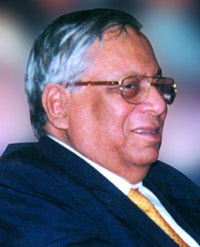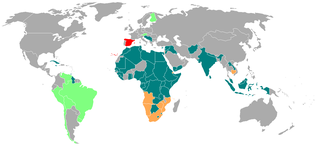
The Food and Agriculture Organization of the United Nations (FAO) is a specialized agency of the United Nations that leads international efforts to defeat hunger and improve nutrition and food security. Its Latin motto, fiat panis, translates to "let there be bread". It was founded on 16 October 1945.

The United Nations Economic and Social Council is one of the six principal organs of the United Nations, responsible for coordinating the economic and social fields of the organization, specifically in regards to the fifteen specialised agencies, the eight functional commissions, and the five regional commissions under its jurisdiction.

The member states of the United Nations comprise 193 sovereign states. The United Nations (UN) is the world's largest intergovernmental organization. All members have equal representation in the UN General Assembly.

The United Nations Conference on Trade and Development (UNCTAD) is an intergovernmental organization within the United Nations Secretariat that promotes the interests of developing countries in world trade. It was established in 1964 by the United Nations General Assembly (UNGA) and reports to that body and the United Nations Economic and Social Council (ECOSOC). UNCTAD is composed of 195 member states and works with nongovernmental organizations worldwide; its permanent secretariat is in Geneva, Switzerland.

The Inter-Parliamentary Union is an international organization of national parliaments. Its primary purpose is to promote democratic governance, accountability, and cooperation among its members; other initiatives include advancing gender parity among legislatures, empowering youth participation in politics, and sustainable development.
The United Nations coordinated an International Conference on Population and Development (ICPD) in Cairo, Egypt, on 5–13 September 1994. Its resulting Programme of Action is the steering document for the United Nations Population Fund (UNFPA).

The United Nations Commission on International Trade Law (UNCITRAL) is a subsidiary body of the U.N. General Assembly (UNGA) responsible for helping to facilitate international trade and investment.
The United Nations Human Settlements Programme (UN-Habitat) is the United Nations programme for human settlements and sustainable urban development. It was established in 1977 as an outcome of the first United Nations Conference on Human Settlements and Sustainable Urban Development held in Vancouver, Canada, in 1976. UN-Habitat maintains its headquarters at the United Nations Office at Nairobi, Kenya. It is mandated by the United Nations General Assembly to promote socially and environmentally sustainable towns and cities with the goal of providing adequate shelter for all. It is a member of the United Nations Development Group. The mandate of UN-Habitat derives from the Habitat Agenda, adopted by the United Nations Conference on Human Settlements in Istanbul, Turkey, in 1996. The twin goals of the Habitat Agenda are adequate shelter for all and the development of sustainable human settlements in an urbanizing world.

Srgjan Kerim is a Macedonian diplomat, economist, former Foreign Minister and President of the 62nd Session of the United Nations General Assembly. His term of office began on September 18, 2007 and ended on September 16, 2008. He is of Macedonian Turkish descent.

International Women's Year (IWY) was the name given to 1975 by the United Nations. Since that year March 8 has been celebrated as International Women's Day, and the United Nations Decade for Women, from 1976 to 1985, was also established.

Humayun Rasheed Choudhury was a Bangladeshi career diplomat and Speaker of the Bangladesh National Parliament from 1996 to 2001. He was elected president of the 41st session of the UN General Assembly in 1986. He was awarded Independence Day Award in 2018 posthumously by the Government of Bangladesh.
The first ever World Population Conference was held at the Salle Centrale, Geneva, Switzerland, from 29 August to 3 September 1927. Organized by the forerunner of the United Nations, the League of Nations, and Margaret Sanger; the conference was an attempt to bring together international experts on population, food supply, fertility, migration and health to discuss the problem of human overpopulation. The conference was organized with funds donated by Sanger's husband, J. Noah Slee, as well as a grant from the Rockefeller Foundation. Sir. Bernard Mallet presided over the meeting, and William H. Welch was vice-president.

The United Nations Department of Economic and Social Affairs is part of the United Nations Secretariat and is responsible for the follow-up to major United Nations Summits and Conferences, as well as services to the United Nations Economic and Social Council and the Second and Third Committees of the United Nations General Assembly. UN DESA assists countries around the world in agenda-setting and decision-making with the goal of meeting their economic, social and environmental challenges. It supports international cooperation to promote sustainable development for all, having as a foundation the 2030 Agenda for Sustainable Development and the 17 Sustainable Development Goals (SDGs) as adopted by the UN General Assembly on 25 September 2015. In providing a broad range of analytical products, policy advice, and technical assistance, UN DESA effectively translates global commitments in the economic, social and environmental spheres into national policies and actions and continues to play a key role in monitoring progress towards internationally agreed-upon development goals. It is also a member of the United Nations Development Group.
The Baháʼí Faith in Mexico begins with visits of Baháʼís before 1916. In 1919 letters from the head of the religion, ʻAbdu'l-Bahá, were published mentioning Mexico as one of the places Baháʼís should take the religion to. Following further pioneers moving there and making contacts the first Mexican to join the religion was in 1937, followed quickly by the first Baháʼí Local Spiritual Assembly of all Latin America being elected in 1938. With continued growth the National Spiritual Assembly was first elected in 1961. The Association of Religion Data Archives estimated almost 37,900 Baháʼís in 2005.

The United Nations Office for Disaster Risk Reduction (UNDRR) was created in December 1999 to ensure the implementation of the International Strategy for Disaster Reduction.
Malaysia became the 82nd member of the United Nations on 17 September 1957. Malaysia has held a rotational non-permanent seat on the United Nations Security Council for four terms, and has participated in over 30 United Nations peacekeeping missions since October 1960.

The Republic of Kazakhstan became a member of the United Nations on March 2, 1992. Kazakhstan was elected to serve on the UN Security Council for the 2017–2018 term. UN Secretary-General António Guterres in remarks to the UNSC recognized Kazakhstan's work to rid the world of weapons of mass destruction and global non-proliferation efforts.

The Socialist Federal Republic of Yugoslavia was one of the founding members of the Non-Aligned Movement. Its capital, Belgrade, was the host of the First Summit of the Non-Aligned Movement in early September 1961. The city also hosted the Ninth Summit in September 1989.

Third Conference of the Non-Aligned Movement on 8–10 September 1970 in Lusaka, Zambia was the third conference of the Non-Aligned Movement. A preparatory meeting of Foreign Ministers drafted a number of resolutions which were considered by the Summit Conference. President of Zambia Kenneth Kaunda opened the conference by underlining non-alignment as "the natural choice at the time of increased hostility created by ideological conflicts in the bipolar world"










